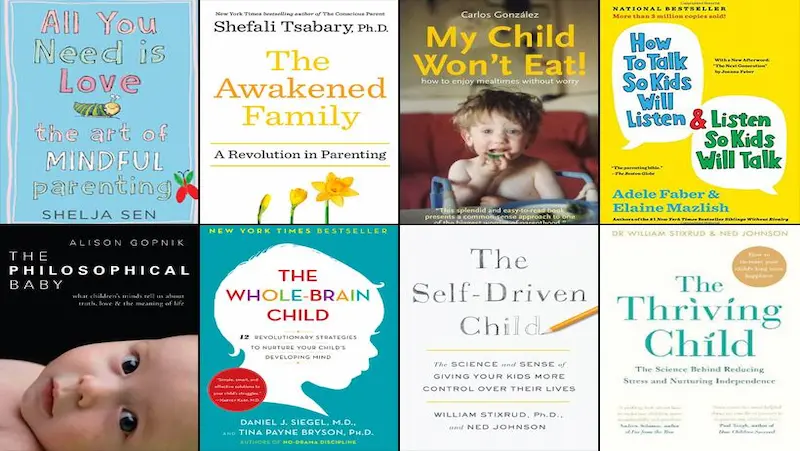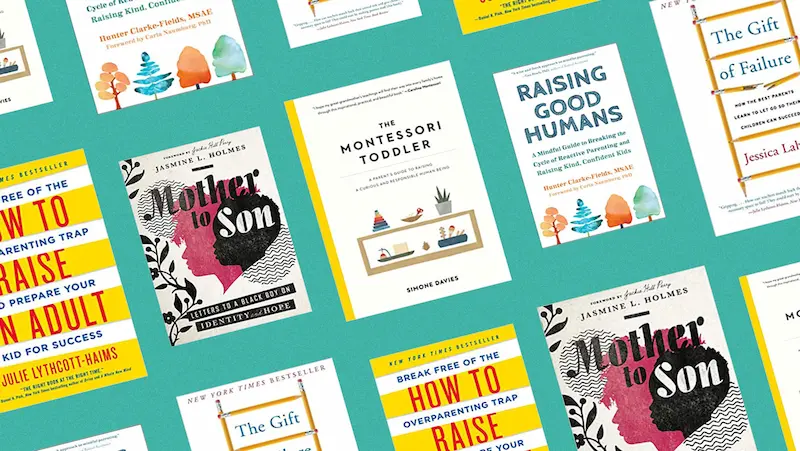Are you seeking a transformative approach to raising your children? Look no further than parenting books. These invaluable resources offer insights, strategies, and support to guide you on your parenting journey.
Discover the power of these books as they help you shape your approach and create meaningful connections with your children.
Table of contents
- Introduction to Parenting Books
- Why Should Parents Read Parenting Books?
- How Parenting Books Can Transform Your Approach
- Factors to Consider When Choosing Parenting Books
- The Benefits of Reading Parenting Books
- Top 10 Must-Read Parenting Books
- Tips for Incorporating Parenting Books into Your Routine
- Conclusion
- Frequently Asked Questions
Introduction to Parenting Books
Parenting books are valuable resources that provide guidance, support, and insights to help parents navigate the challenges of raising children. These books cover a wide range of topics, including child development, discipline techniques, communication strategies, and fostering positive relationships with your children.
Whether you are a new parent seeking advice or an experienced parent looking for fresh perspectives, parenting books can be a valuable tool in your parenting journey.
Why Should Parents Read Parenting Books?
1. Knowledge and Understanding: Parenting books offer a wealth of knowledge on child development, behavior, and psychology. By reading these books, parents can gain a better understanding of their child’s needs, motivations, and developmental milestones. This knowledge can help parents make informed decisions and provide appropriate support and guidance to their children.
2. Practical Guidance: Parenting books provide practical advice and strategies to address common parenting challenges. They offer insights into effective discipline techniques, communication skills, problem-solving methods, and nurturing healthy relationships with children. Reading these books equips parents with the tools and techniques necessary to navigate the ups and downs of parenthood.
3. Confidence Boost: Parenting can be an overwhelming experience, especially for new parents. Reading parenting books can boost parents’ confidence by providing reassurance that they are not alone in their struggles. These books often share stories and experiences of other parents, which can help parents feel understood and validated in their parenting journey.
4. Different Perspectives: Parenting books offer a diverse range of perspectives and approaches to raising children. They present various parenting philosophies, allowing parents to explore different strategies and find what resonates with their own values and beliefs. By exposing themselves to different viewpoints, parents can broaden their perspectives and make more informed choices about their parenting style.
5. Self-Reflection: Parenting books often encourage self-reflection and personal growth. They prompt parents to examine their own strengths, weaknesses, and biases, helping them become more self-aware and intentional in their parenting. By reflecting on their own parenting practices, parents can identify areas for improvement and make positive changes that benefit both themselves and their children.
How Parenting Books Can Transform Your Approach
1. Improved Communication: Parenting books provide insights into effective communication techniques with children. They offer strategies for active listening, expressing emotions, and resolving conflicts in a healthy and constructive manner. By incorporating these techniques, parents can foster better communication with their children, leading to stronger relationships and mutual understanding.

2. Enhanced Problem-Solving Skills: Parenting books often offer practical advice on how to approach and solve common parenting challenges. They provide step-by-step guides, problem-solving frameworks, and tips for brainstorming creative solutions. By applying these strategies, parents can become more adept at addressing issues and finding resolutions that work for their families.
3. Tailored Parenting Approach: Every child is unique, and parenting books recognize this diversity. They encourage parents to adapt their approach to meet the individual needs of their children. By reading these books, parents can learn to recognize and appreciate their child’s temperament, learning style, and personality traits. This knowledge allows parents to tailor their parenting techniques and adapt them to their child’s specific needs.
4. Positive Parent-Child Bond: Parenting books emphasize the importance of nurturing a positive and strong bond with children. They provide insights into building trust, fostering open communication, and creating a loving and supportive environment. By implementing these strategies, parents can deepen their connection with their children, resulting in a more fulfilling and harmonious parent-child relationship.
5. Continuous Learning and Growth: Parenting books promote lifelong learning and personal growth. They encourage parents to stay curious, seek new information, and adapt their approach as their children grow and develop. By continuously learning and evolving as parents, individuals can provide the best possible environment for their children’s well-being and growth.

Factors to Consider When Choosing Parenting Books
1. Reliability and Credibility: Look for parenting books written by authors who have expertise in child development, psychology, or related fields. Consider their qualifications and reputation to ensure that the information presented is reliable and evidence-based.
2. Compatibility with Your Parenting Philosophy: Consider whether the book aligns with your own values and beliefs about parenting. Different books may advocate for various approaches, so choose one that resonates with your parenting style and goals.
3. Relevance to Your Child’s Age and Developmental Stage: Some parenting books focus on specific age groups or developmental stages. Consider your child’s current stage and select a book that addresses the challenges and needs associated with that stage.
4. Reviews and Recommendations: Read reviews and seek recommendations from other parents or trusted sources. This can help you gauge the usefulness and applicability of the book to your specific situation.
5. Practicality and Applicability: Consider whether the book provides practical advice and actionable strategies that you can implement in your daily life. Look for books that offer real-life examples and step-by-step guidance to ensure their relevance to your parenting journey.

The Benefits of Reading Parenting Books
1. Increased Knowledge and Awareness: Parenting books provide valuable information about child development, behavior, and parenting techniques. Reading these books enhances your knowledge and awareness of various aspects of parenting, allowing you to make more informed decisions.
2. Improved Parenting Skills: By learning new strategies and techniques from parenting books, you can enhance your parenting skills. These books offer practical advice and tips to address common challenges and improve your interactions with your children.
3. Confidence and Empowerment: Parenting books can boost your confidence as a parent. When you have access to expert advice and successful strategies, you feel more empowered to handle parenting situations and make informed choices for your family.
4. Support and Validation: Parenting books often share stories and experiences from other parents, helping you feel understood and validated in your own parenting journey. These books remind you that you are not alone in facing challenges and provide support along the way.
5. Broadened Perspective: Reading parenting books exposes you to different parenting philosophies and perspectives. This broadens your understanding of diverse approaches, allowing you to adopt techniques that align with your values and adapt them to your unique family dynamics.
6. Strengthened Parent-Child Relationships: Parenting books emphasize the importance of nurturing strong bonds with your children. By implementing the strategies and techniques suggested in these books, you can enhance communication, trust, and connection with your child, fostering a positive and loving relationship.
7. Personal Growth and Self-Reflection: Parenting books often encourage self-reflection and personal growth. They prompt you to examine your own parenting practices, beliefs, and biases. This introspection helps you identify areas for improvement and make positive changes in your parenting approach.
Remember that while parenting books can be helpful resources, every child and family is unique. It’s essential to adapt the advice and strategies to suit your individual circumstances and values.

Top 10 Must-Read Parenting Books
1. “The Whole-Brain Child” by Daniel J. Siegel and Tina Payne Bryson: This book explores the connection between neuroscience and parenting, offering practical techniques to help parents understand and nurture their child’s developing brain.
2. “Parenting with Love and Logic” by Charles Fay and Foster Cline: This book introduces a parenting philosophy that emphasizes empathy, natural consequences, and allowing children to learn from their mistakes while maintaining a loving and respectful relationship.
3. “Simplicity Parenting” by Kim John Payne: Focusing on the importance of simplifying family life, this book provides guidance on reducing clutter, creating routines, and fostering a calm and nurturing environment for children.
4. “How to Talk So Kids Will Listen & Listen So Kids Will Talk” by Adele Faber and Elaine Mazlish: This classic book offers practical communication strategies to improve parent-child relationships, promote cooperation, and resolve conflicts effectively.
5. “The Conscious Parent” by Dr. Shefali Tsabary: This book encourages parents to develop a mindful and conscious approach to parenting, emphasizing self-reflection, emotional intelligence, and authentic connections with their children.
6. “Parenting from the Inside Out” by Daniel J. Siegel and Mary Hartzell: Exploring the impact of a parent’s own history on their parenting style, this book provides insights into how parents can develop self-awareness and heal their own emotional wounds to become more present and attuned caregivers.
7. “The 5 Love Languages of Children” by Gary Chapman and Ross Campbell: Drawing from the popular concept of love languages, this book helps parents identify and understand their child’s unique way of receiving love and affection, fostering a deeper emotional connection.
8. “No-Drama Discipline” by Daniel J. Siegel and Tina Payne Bryson: This book offers strategies for disciplining children with empathy and understanding, focusing on teaching rather than punishing, and fostering emotional intelligence and self-regulation. Learn about budgeting for kids also.
9. “Parenting with Positive Discipline” by Jane Nelsen: Based on the principles of mutual respect and cooperation, this book provides practical tools for guiding children’s behavior, resolving conflicts peacefully, and nurturing their self-esteem.
10. “The Montessori Toddler” by Simone Davies: Specifically geared towards toddlers, this book introduces Montessori principles and techniques for fostering independence, promoting self-discipline, and creating a supportive environment that encourages learning and exploration.
Remember, while these books offer valuable insights, it’s important to adapt the strategies to fit your family’s unique dynamics and values.

Tips for Incorporating Parenting Books into Your Routine
1. Set aside dedicated time: Schedule regular reading sessions specifically for parenting books. It could be a few minutes each day or longer periods on weekends. Consistency is key to making reading a habit.
2. Choose books that align with your needs: Select parenting books that address your current challenges or interests. Focus on topics that resonate with your parenting goals and priorities.
3. Take notes and highlight key points: Keep a notebook or use sticky notes to jot down important insights, strategies, and ideas from the books. This helps you remember and revisit valuable information later.
4. Discuss with your partner or join a parenting book club: Engage in conversations with your partner about the book’s content. Share thoughts, and perspectives, and exchange ideas. Consider joining a parenting book club or online forums to discuss and learn from other parents.
5. Implement one concept at a time: Rather than overwhelming yourself with numerous techniques, focus on applying one concept at a time. Experiment with the strategies suggested in the book and observe the results before moving on to the next.
6. Adapt the ideas to your family’s needs: Remember that every family is unique. Tailor the suggestions from the book to suit your family’s dynamics, values, and cultural background. Modify and personalize the strategies to best fit your circumstances.
7. Reflect and evaluate: Take time to reflect on your experiences after implementing the book’s recommendations. Assess what worked well and what didn’t. Make adjustments or try alternative approaches based on your observations.
8. Seek additional resources: Expand your knowledge by exploring related articles, podcasts, or videos on the topics covered in the parenting books. Supplementing your reading with diverse perspectives can enrich your understanding and offer alternative strategies.
9. Be patient and adaptable: Parenting is a continuous learning process. Be patient with yourself and your children as you integrate new approaches. Adjust your strategies as needed, knowing that it takes time and experimentation to find what works best for your family.
10. Enjoy the journey: Embrace the joy of learning and growing as a parent. Parenting books provide valuable insights and tools but remember to enjoy the experience of connecting with your children and witnessing their growth along the way.

Conclusion
In conclusion, incorporating parenting books into your routine can be a transformative and enriching experience. These books offer valuable knowledge, practical strategies, and support to help you navigate the complexities of parenting.
By setting aside dedicated time, choosing relevant books, and actively engaging with the content, you can gain valuable insights and apply them to your parenting approach. Remember to personalize the ideas to suit your family’s unique needs, reflect on your experiences, and be patient with yourself as you navigate this journey.
Embrace the opportunity for personal growth, learn finance for kids enjoy the process of learning, and cherish the connections you build with your children along the way. Parenting books can truly be a valuable tool on your path to becoming the best parent you can be.
Also, BrightChamps provides a comprehensive platform for learning about money for kids, offering interactive and engaging resources that teach financial literacy, budgeting, saving, and other essential money management skills.
Frequently Asked Questions
The top 10 must-read parenting books that can transform your approach are “The Whole-Brain Child,” “Parenting with Love and Logic,” “Simplicity Parenting,” “How to Talk So Kids Will Listen & Listen So Kids Will Talk,” “The Conscious Parent,” “Parenting from the Inside Out,” “The 5 Love Languages of Children,” “No-Drama Discipline,” “Parenting with Positive Discipline,” and “The Montessori Toddler.”
Parenting books can help you become a better parent by providing knowledge, practical guidance, and strategies to address challenges, improve communication, strengthen relationships, and promote personal growth.
These books cover a range of age groups, from toddlers to adolescents, offering insights and techniques tailored to specific developmental stages.
Each book stands out for its unique perspective and approach. “The Whole-Brain Child” integrates neuroscience and parenting, while “Parenting with Love and Logic” emphasizes empathy and natural consequences. “Simplicity Parenting” focuses on simplifying family life, and “The Conscious Parent” promotes mindful parenting.
Make the most of parenting books by setting aside dedicated reading time, taking notes, discussing with your partner, and applying one concept at a time to your daily life.
These books advocate various parenting philosophies, including brain-based parenting, positive discipline, Montessori principles, and conscious parenting. They differ in their emphasis and techniques but share the goal of fostering healthy parent-child relationships.
Yes, these books address common parenting challenges such as discipline, communication, and building positive parent-child relationships, offering practical strategies and advice.
Some books specifically focus on parenting children with special needs or unique family dynamics, such as “The Explosive Child” by Ross W. Greene or “The Blessing of a Skinned Knee” by Wendy Mogel.
Choose a book based on your specific concerns or goals, considering the author’s expertise, reviews, and recommendations from other parents or professionals.
These books have generally been well-received by parents and experts, with many success stories and testimonials highlighting their effectiveness in transforming parenting approaches and improving parent-child relationships.


 We are an army of educators and passionate learners from BrightChamps family, committed to providing free learning resources to kids, parents & students.
We are an army of educators and passionate learners from BrightChamps family, committed to providing free learning resources to kids, parents & students.
















